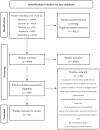Predisposing, Enabling, and Need Factors Associated with Psychotropic Medication and Mental Health Service Use among Children in Out-of-Home Care in the United States: A Scoping Review
- PMID: 37754629
- PMCID: PMC10531290
- DOI: 10.3390/ijerph20186769
Predisposing, Enabling, and Need Factors Associated with Psychotropic Medication and Mental Health Service Use among Children in Out-of-Home Care in the United States: A Scoping Review
Abstract
This scoping review aimed to identify predisposing, enabling, and need factors associated with the use of mental health services, including psychotropic medications, among children in out-of-home care in the United States. We searched the PsycInfo, SocINDEX, Medline, and Scopus databases, and 22 studies met inclusion criteria and were systematically analyzed. Among the included studies, 7 studies examined predictors associated with taking psychotropic medications, and 16 examined factors associated with using other mental health services. Significant predisposing, enabling, and need factors associated with greater use of mental health services, including psychotropic medications, were identified. The most frequently identified predisposing factors were child race/ethnicity, age, gender, and maltreatment. Important enabling factors were out-of-home placement type and length of care, and need factors included children's mental/behavioral problems. The results provide insight into maximizing factors facilitating children's use of mental health services to address mental health problems of children in out-of-home care. Further, the results imply the importance of the appropriate use of psychotropic medication (e.g., the type and dosage of medications) among children in out-of-home care. The identified factors can inform child welfare agencies and stakeholders on ways to improve access to mental health services and the appropriate use of psychotropic medications among children in out-of-home care in the United States.
Keywords: Andersen’s behavioral model of health service use; mental health service; out-of-home care; predisposing, enabling, and need factors; psychotropic medications.
Conflict of interest statement
The authors declare no conflict of interest. The funders had no role in the design of the study; in the collection, analyses, or interpretation of data; in the writing of the manuscript; or in the decision to publish the results.
Figures
Similar articles
-
Factors associated with mental health services referrals for children investigated by child welfare.Child Abuse Negl. 2018 May;79:401-412. doi: 10.1016/j.chiabu.2018.01.020. Epub 2018 Mar 20. Child Abuse Negl. 2018. PMID: 29529594
-
Investigating geographic variation in use of psychotropic medications among youth in child welfare.Child Abuse Negl. 2011 May;35(5):333-42. doi: 10.1016/j.chiabu.2011.01.012. Child Abuse Negl. 2011. PMID: 21620160
-
Evidence Use in Mental Health Policy Making for Children in Foster Care.Adm Policy Ment Health. 2016 Jan;43(1):52-66. doi: 10.1007/s10488-015-0633-1. Adm Policy Ment Health. 2016. PMID: 25711392
-
Management of psychotropic medications in adults with intellectual disability: a scoping review.Ann Med. 2022 Dec;54(1):2486-2499. doi: 10.1080/07853890.2022.2121853. Ann Med. 2022. PMID: 36120887 Free PMC article.
-
A Chinese help-seeking model for psychological distress in primary care: An adaptation of Andersen's Behavioral Model of Health Services Use.Transcult Psychiatry. 2024 Apr;61(2):182-193. doi: 10.1177/13634615231225130. Epub 2024 Jan 17. Transcult Psychiatry. 2024. PMID: 38233734 Review.
References
-
- Child Welfare Information Gateway Out-of-Home Care. [(accessed on 10 September 2023)]; Available online: https://www.childwelfare.gov/topics/outofhome/
-
- U.S. Department of Health and Human Services Trends in Foster Care and Adoption: FY 2012–2021. [(accessed on 10 September 2023)];2022 Available online: https://www.acf.hhs.gov/cb/report/trends-foster-care-adoption.
-
- Anctil T.M., McCubbin L.D., O’Brien K., Pecora P. An evaluation of recovery factors for foster care alumni with physical or psychiatric impairments: Predictors of psychological outcomes. Child. Youth Serv. Rev. 2007;29:1021–1034. doi: 10.1016/j.childyouth.2007.02.003. - DOI
-
- Courtney M.E., Dworsky A. Early outcomes for young adults transitioning from out-of-home care in the USA. Child Fam. Soc. Work. 2006;11:209–219. doi: 10.1111/j.1365-2206.2006.00433.x. - DOI
Publication types
MeSH terms
Substances
LinkOut - more resources
Full Text Sources
Medical
Miscellaneous



